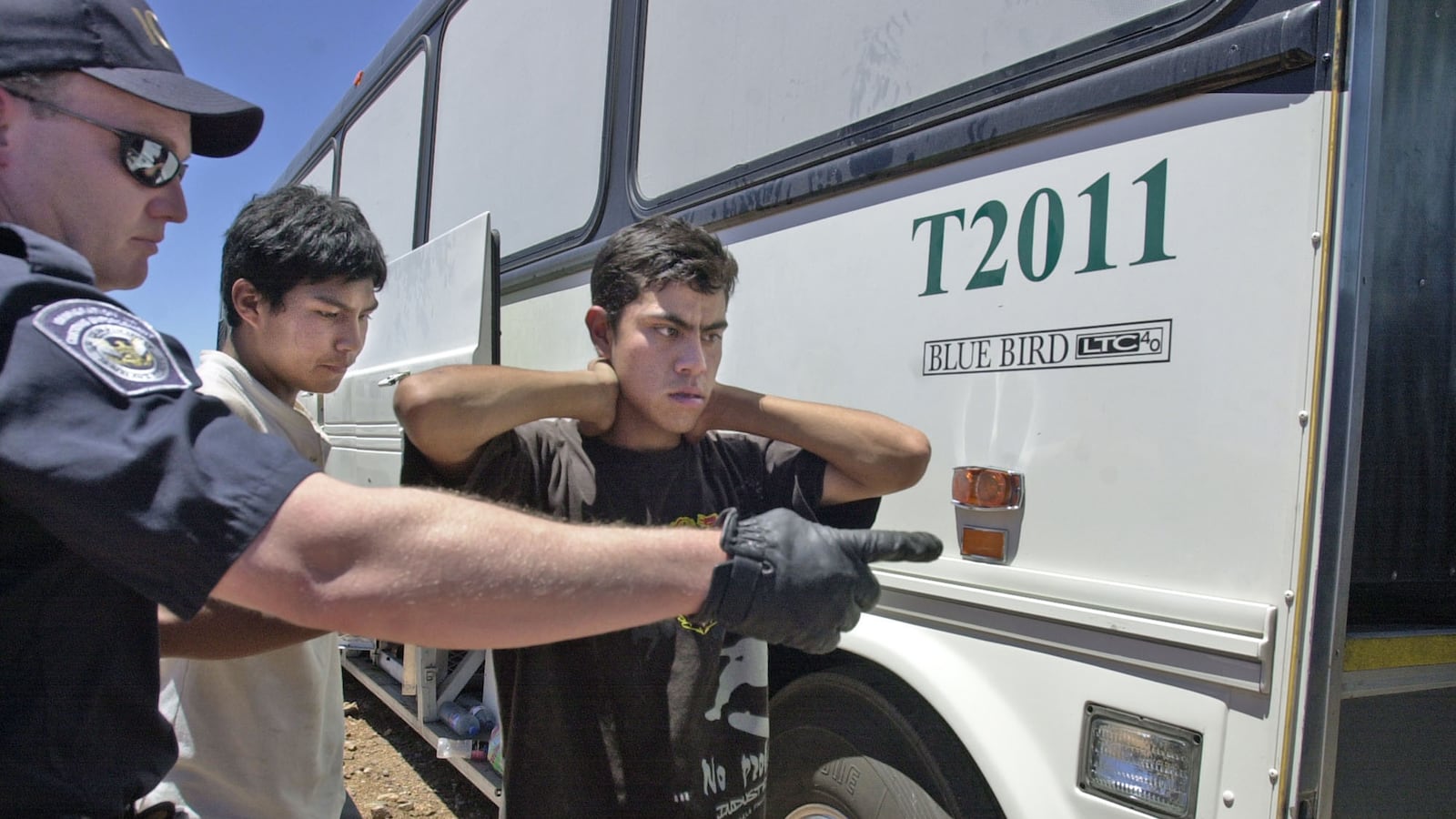“I was in the middle of nowhere. Three agent men against one woman—with her two children—in the middle of the desert where nobody is around. They could have done anything to me and my kids.”

In a video posted on the ACLU’s website this week, Clarisa Christiansen recalls her chilling encounter with a posse of Border Patrol agents while driving her two children home from elementary school last May. Despite being accustomed to seeing agents regularly roving around Three Points, Arizona, the desert community approximately 40 miles north of the U.S.-Mexico border where Christiansen’s family has lived for almost 18 years, this was the first time she’d been approached by them.
Christiansen says she was pulled over by a Border Patrol vehicle on a dirt road about two miles from her home. The agents asked her if she was a U.S. citizen—which she is—and ordered to exit her vehicle so it could be searched, she said. After repeatedly requesting, unsuccessfully, for an explanation as to why she was being pulled over, Christiansen says she attempted to drive away. That’s when, she says, the agent who pulled her over called to the other two agents in the Border Patrol car: “This one’s being difficult. Get the taser.”
According to Christiansen’s account, the agent then opened the door to the driver’s side of her car and asked, “Ma’am, do I need to tase you to get you out of your vehicle?” Christiansen replied that all she wanted was an explanation for why she was pulled over; at that point, she says, the agent pulled out a knife and asked, “Ma’am, do I need to cut you out of your seat belt?”
It was only when the agent reached inside and pulled the keys out of the ignition, Christiansen says, that she finally got out of the car. “If I didn’t get out of the vehicle, I felt like this man that was threatening to tase me and cut me out of my seat belt was going to hurt me,” she recalls.
After the agents ran a background check with her license, Christiansen returned to her car, where her young children were waiting anxiously, and noticed that her rear tire was flat and had a visible incision that suggested it had been slashed with a knife. Her attempts to file a complaint against the agents who pulled her over—and receive compensation for the damaged tire—led her in a bureaucratic circle from which Christiansen gained little more than a headache.
Christiansen is just one of countless U.S. citizens and residents, living in towns along the southern border, for whom tense encounters with Border Patrol agents have become a regular and uncomfortable part of life. Over the past year, celebratory pronouncements that illegal border crossings have reached a 40-year low have been met with reports of racial profiling, prolonged detainment, unlawful property seizure and even unwarranted cavity searches by Customs and Border Protection officers at ports of entry, not to mention unscrupulous use of deadly force and rampant corruption within the CBP’s inflated ranks. With nearly 21,000 Border Patrol agents plus 21,650 CBP officers at ports of entry, U.S. Customs and Border Protection is by far the largest law enforcement agency in the country, and one of the biggest in the world. Most of these problems have been blamed by watchdogs on hurried hiring and sloppy training.
Less well documented, however, is the impact Border Patrol expansion has had on the communities that line the American frontier. Thanks to the very first border search statute enacted by the very first Congress in 1789, customs officials are legally authorized to stop and search any person, vehicle or property entering the United States without the probable cause otherwise required by the Constitution’s Fourth Amendment. And thanks to the Immigration and Nationality Act (INA) of 1952, immigration officers and employees have the power to use that exemption to arbitrarily set up checkpoints, stop and search individuals, vehicles, or public transportation, and even make arrests within 100 miles of the U.S. border.
The ACLU, border-town residents, members of Congress and even some border patrol agents argue that the rapid and vast expansion of immigration enforcement in the years since the Department of Homeland Security was created, without expanded oversight to match it, has turned the southern border of the U.S. into an occupied police state, where abuses of power and harassment by agents are an everyday occurrence.
“I’ve lost count of how many times I’ve been stopped and sent to secondary inspection at a checkpoint,” U.S. Rep. Beto O’Rourke (D-Texas) told The Daily Beast. “If I want to go to Albuquerque or San Diego I have to go through one of these interior checkpoints, and almost every time I’m stopped.”
On a recent occasion, the freshman Democrat who was born and raised in El Paso, Texas said he and his two-year-old son were detained in a holding cell for 30 minutes while Border Patrol agents searched his truck.
“My story is not exceptional. There are some really egregious incidents, people being detained for hours, their personal belongings confiscated, forced to undergo cavity searches, defecate in front of officers and undergo CT scans to prove that they’re not smuggling anything,” he said.
It’s experiences like these, as recounted to him by a number of his constituents, that prompted O’Rourke to enlist the help of the ACLU; the Border Network for Human Rights, an immigration reform and human rights advocacy group; and the National Border Patrol Council, the union that represents Border Patrol agents, in drafting legislation calling for accountability, transparency and oversight for Customs and Border Protection.
“We can point to enough horror stories to establish that there is a problem,” O’Rourke said.
Like Clarisa Christiansen and the other individuals mentioned in the ACLU complaints, O’Rourke has been similarly stonewalled when trying to find answers to questions about CBP’s policies on use of force, search and seizure, staffing, training—basically anything regarding how the $18 billion the federal government now spends on border security each year is being used.
O’Rourke and Republican Rep. Steve Pearce, whose district covers much of southern part of New Mexico, introduced the Border Enforcement, Accountability, Oversight, and Community Engagement Act of 2014 to the House of Representatives in March.
H.R. 4303 creates an “Ombudsman for Border and Immigration Related Concerns,” where local residents can direct their complaints, and an independent commission that considers those complaints and makes recommendations to the Department of Homeland Security Secretary, who is bound by law to either adopt them or provide a compelling reason not to along with a suitable alternative.
The bill also mandates the implementation of a standardized training process for all CBP officers and Border Patrol agents. Currently, training can range between 10 and 19 weeks, depending on the circumstances. O’Rourke and Pearce want 19 weeks of training across the board, which “will focus on being sensitive to the communities in which the agents and officers work,” and also ensure that agents and officers are familiar with constitutional rights and civil liberties.
“It’s really hard for people to grasp that, as the CBP interprets it, civil liberties and constitutional protections are suspended 100 miles into the interior of the U.S.,” O’Rourke said, noting that roving patrols and checkpoints are hardly specific to the U.S.- Mexico border. In 2012, for example, the ACLU filed a class action lawsuit on behalf of three residents in the Olympic Peninsula, on the northwest border of Washington state, who claimed Border Patrol agents in the area were stopping and searching vehicles based on the drivers’ appearance and ethnicity. The suit was settled with the agreement that Border Patrol agents assigned to the Olympic Peninsula would receive additional training on Fourth Amendment protections and document and report all stops. In a more high-profile case, a U.S.-French dual citizen sued the DHS in 2010 after Border Patrol agents apprehended him on an Amtrak train running from Canada to New York and held his laptop for 11 days. He argued that the search and seizure of his electronic device without a warrant violated his Fourth Amendment rights. The court sided with the government.
“CBP enjoys these really unique policing powers that would violate the constitution in any other party of the country,” said O’Rourke. “It’s long been accepted that this is the price we’re willing to pay for safety at our borders. We just ask that with that power comes a greater responsibility to be transparent and professional.”
Meanwhile, the ACLU of Arizona has been making its own attempt to influence change within the notoriously impenetrable Department of Homeland Security—the agency of which Customs and Border Protection is a part. Christiansen’s chilling story is one of five—which include tales of assault, baseless accusations of drug smuggling, trespassing and simple antagonizing—mentioned in a complaint the ACLU sent to the DHS’s Deputy Inspector General and Officer for Civil Rights and Civil Liberties back in October of last year.
The complaint requests that the DHS investigate reports of racial profiling, unlawful search and seizure, excessive force, and trespassing by agents in southern Arizona. In January, the ACLU of Arizona sent the DHS another complaint requesting an investigation into similar alleged abuses by agents at U.S. Border Patrol checkpoints in the interior of the state. This complaint detailed 12 other incidents not unlike the one Christiansen describes.
Attorney James Lyall works for the ACLU’s Border Litigation Project in Tucson, an initiative focused specifically on investigating, documenting and litigating civil and human-rights cases along the U.S. border with Mexico. Lyall says he’s received over 100 reports of abuses by Border Patrol agents since the ACLU launched the project in June.
“It’s really hard to overstate how much those numbers understate the problem,” he told The Daily Beast. “People get pulled over by Border Patrol all the time and they don’t know what their rights are. Or, they know their rights were violated but they think, ‘What’s the point?’ because filing a complaint usually is confusing and doesn’t do anything.”
Douglas Mosier, the El Paso Branch Chief for the CBP’s Office of Public Affairs, responded to The Daily Beast’s request for comment on the ACLU’s claims with this statement:
“CBP Officers and Border Patrol Agents enforce the nation’s laws while preserving the civil rights and civil liberties of all people with whom CBP personnel interact. CBP officers and agents are trained to recognize people and situations that present a potential threat or violation of law without regard to race. CBP does not tolerate racial profiling or agent misconduct and appropriately investigates allegations of wrongdoing.
Border Patrol traffic checkpoints are a critical enforcement tool for carrying out the mission of securing our nation’s borders against transnational threats. Checkpoints deny major travel routes from the borders to smugglers intent on delivering people, drugs and other contraband to the interior of the United States and allow the Border Patrol to establish an important second layer of defense.”
Lyall says he hasn’t received much more of a response from DHS to his complaints, either.
“We received a form letter from the Office of Civil Rights and Civil liberties saying they are investigating,” he said. “But we’ve had a similar complaint that we filed on behalf of 11 people that’s been pending for two years now.”
“Unfortunately, ultimately we’ll need to litigate these issues. It’s only a matter of time,” he continued. “We receive these reports on a daily or weekly basis. Any one of them could be a lawsuit.”






